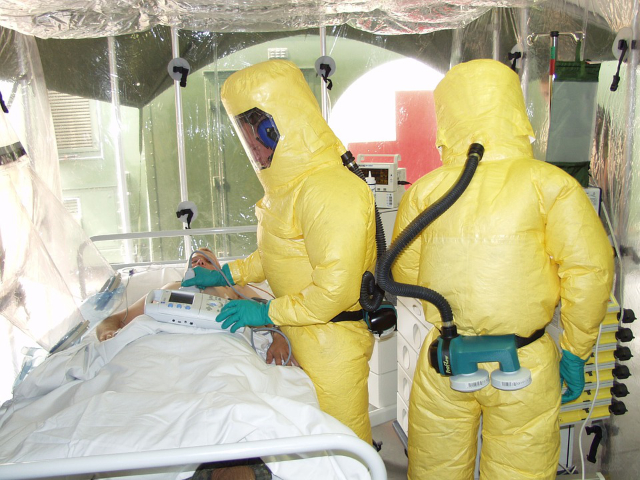We've got to stop turning our backs on Ebola

Remember back in 2014 when everyone thought that an Ebola outbreak in Africa wouldn't be a problem for North Americans and then - and this is the shit and giggle part - four laboratory-confirmed cases of the hemorrhagic fever showed up in the United States? Everyone, justifiably, freaked out. The panic didn't last, though. As the countries like Liberia, Mali and Sierra Leone began to report that the control measures put in place to stem the spread of the disease were starting to have an effect, the notion of Ebola being the big-bad of our time faded from the public eye. But just because you can't see something doesn't mean it can't hurt you.
From the CBC:
Cases of hemorrhagic fever were reported in an area of Congo facing an Ebola epidemic as long ago as December and the first deaths were reported in January, the World Health Organization said on Thursday, as four new suspected cases surfaced.
The health ministry said on Tuesday that at least 17 people had died in an area of northwestern Democratic Republic of Congo where health officials have now confirmed an outbreak of Ebola, although it did not give a time-frame for the deaths.
Only two confirmed cases: no big deal, right? It's hard to say.
Ebola takes time to show itself. Someone who's contracted the disease can wander around, feeling great and infecting people as they go, for weeks, before any symptoms arise. According to the CBC, this time around, while only two cases of the disease have been confirmed, experts on the ground suspect that four new cases, including two nurses who were treating individuals infected with Ebola, will soon be verified as well. That's a good start to what could become a bad situation.
It's hard to track down Ebola. While most folks know it for how it can break down the tissues of internal organs and damage blood vessels to the point where victims of the disease die of shock, blood loss and other terrible conduits into the Great Beyond, its other symptoms, such as headaches, sore muscles, fever and diarrhea are more subtle. You could contract Ebola and, early on, mistake it for a flu. Doing so could be one of the last mistakes that you ever make. During the 2014 outbreak, the World Health Organization reckons that the number of confirmed and probable cases of the disease in the places where the outbreak were the worst - Guinea, Liberia, Nigeria, and Sierra Leone - was 3,069. Of those, 1,552 died. That's an overall mortality rate of 52%, which is terrifying. But the killing doesn't stop there. Despite the fact that it stopped popping up in our news cycle, the 2014 outbreak was the worst in recorded history. After the initial panic over the spread of Ebola waned and we all went back to watching True Detective, the disease continued to be a going concern right up until two years ago when the outbreak was declared, officially, to be at an end. By then, 28,800 individuals in West Africa were infected with the disease and over 11,300 people had died of it.
Did any of you know that? I sure as hell didn't until I looked it up today.
It seems like something so deadly which spreads so easily, thanks to how widely we travel, would have been worth keeping a closer eye on. But we didn't. Apathy's something most of us settle into like a warm bath. I have a feeling that this latest Ebola outbreak could get lost in the shuffle of peace talks in Asia, the ever-widening conflict in the Middle East and the threats to democracy here at home.
Of all the bad news that could occupy my sleepless head at night, I'm pretty sure that the slow, steady crawl of Ebola in nations we all too often forget about will be at the top of my list.
Image via Pixabay